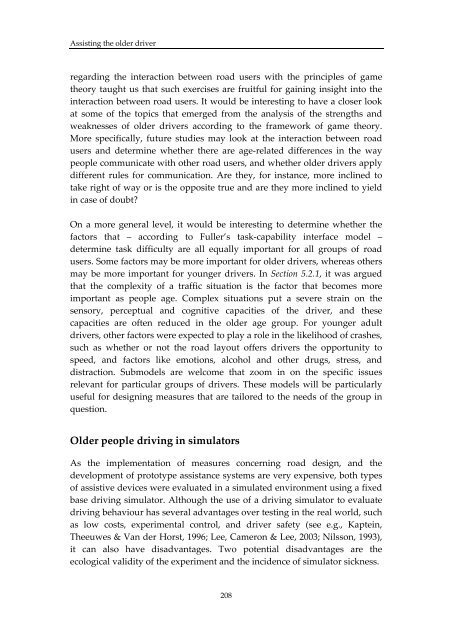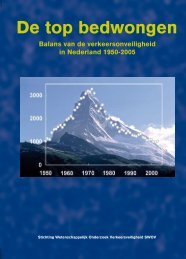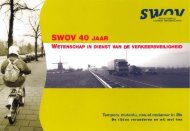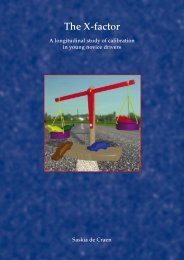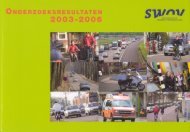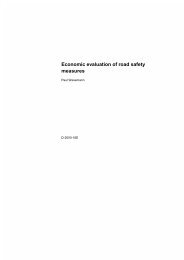Assisting the older driver - SWOV
Assisting the older driver - SWOV
Assisting the older driver - SWOV
You also want an ePaper? Increase the reach of your titles
YUMPU automatically turns print PDFs into web optimized ePapers that Google loves.
<strong>Assisting</strong> <strong>the</strong> <strong>older</strong> <strong>driver</strong><br />
regarding <strong>the</strong> interaction between road users with <strong>the</strong> principles of game<br />
<strong>the</strong>ory taught us that such exercises are fruitful for gaining insight into <strong>the</strong><br />
interaction between road users. It would be interesting to have a closer look<br />
at some of <strong>the</strong> topics that emerged from <strong>the</strong> analysis of <strong>the</strong> strengths and<br />
weaknesses of <strong>older</strong> <strong>driver</strong>s according to <strong>the</strong> framework of game <strong>the</strong>ory.<br />
More specifically, future studies may look at <strong>the</strong> interaction between road<br />
users and determine whe<strong>the</strong>r <strong>the</strong>re are age‐related differences in <strong>the</strong> way<br />
people communicate with o<strong>the</strong>r road users, and whe<strong>the</strong>r <strong>older</strong> <strong>driver</strong>s apply<br />
different rules for communication. Are <strong>the</strong>y, for instance, more inclined to<br />
take right of way or is <strong>the</strong> opposite true and are <strong>the</strong>y more inclined to yield<br />
in case of doubt?<br />
On a more general level, it would be interesting to determine whe<strong>the</strong>r <strong>the</strong><br />
factors that – according to Fuller’s task‐capability interface model –<br />
determine task difficulty are all equally important for all groups of road<br />
users. Some factors may be more important for <strong>older</strong> <strong>driver</strong>s, whereas o<strong>the</strong>rs<br />
may be more important for younger <strong>driver</strong>s. In Section 5.2.1, it was argued<br />
that <strong>the</strong> complexity of a traffic situation is <strong>the</strong> factor that becomes more<br />
important as people age. Complex situations put a severe strain on <strong>the</strong><br />
sensory, perceptual and cognitive capacities of <strong>the</strong> <strong>driver</strong>, and <strong>the</strong>se<br />
capacities are often reduced in <strong>the</strong> <strong>older</strong> age group. For younger adult<br />
<strong>driver</strong>s, o<strong>the</strong>r factors were expected to play a role in <strong>the</strong> likelihood of crashes,<br />
such as whe<strong>the</strong>r or not <strong>the</strong> road layout offers <strong>driver</strong>s <strong>the</strong> opportunity to<br />
speed, and factors like emotions, alcohol and o<strong>the</strong>r drugs, stress, and<br />
distraction. Submodels are welcome that zoom in on <strong>the</strong> specific issues<br />
relevant for particular groups of <strong>driver</strong>s. These models will be particularly<br />
useful for designing measures that are tailored to <strong>the</strong> needs of <strong>the</strong> group in<br />
question.<br />
Older people driving in simulators<br />
As <strong>the</strong> implementation of measures concerning road design, and <strong>the</strong><br />
development of prototype assistance systems are very expensive, both types<br />
of assistive devices were evaluated in a simulated environment using a fixed<br />
base driving simulator. Although <strong>the</strong> use of a driving simulator to evaluate<br />
driving behaviour has several advantages over testing in <strong>the</strong> real world, such<br />
as low costs, experimental control, and <strong>driver</strong> safety (see e.g., Kaptein,<br />
Theeuwes & Van der Horst, 1996; Lee, Cameron & Lee, 2003; Nilsson, 1993),<br />
it can also have disadvantages. Two potential disadvantages are <strong>the</strong><br />
ecological validity of <strong>the</strong> experiment and <strong>the</strong> incidence of simulator sickness.<br />
208


